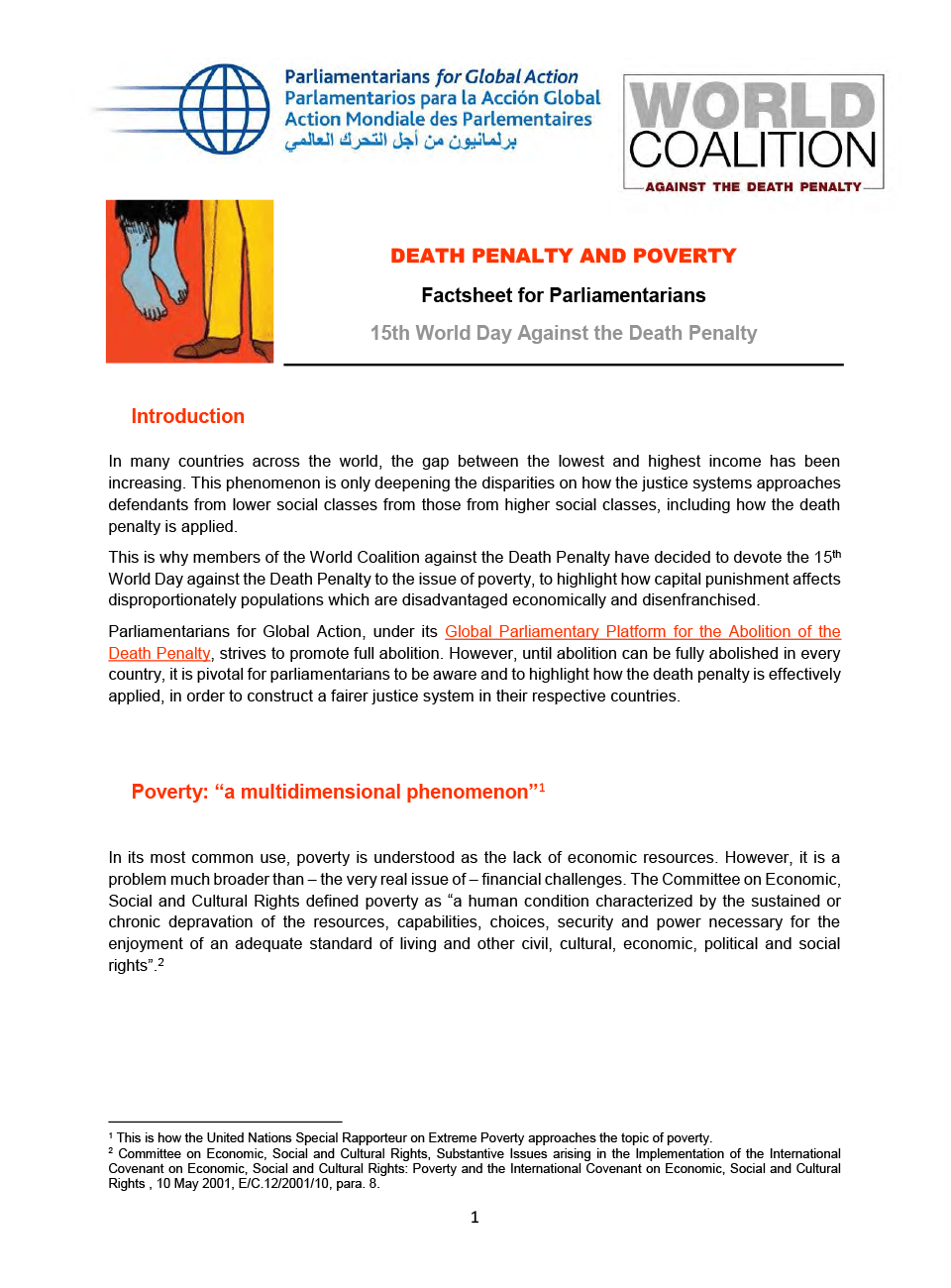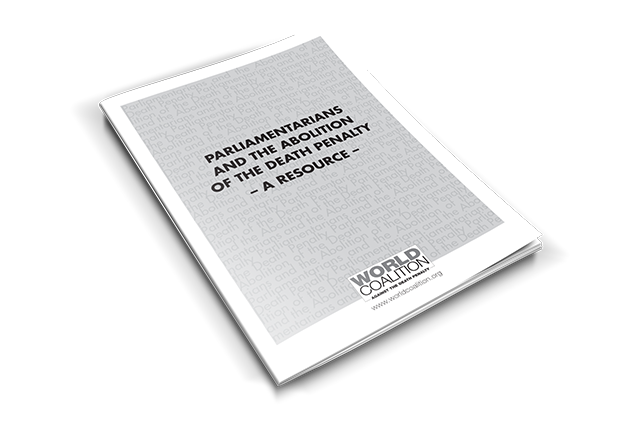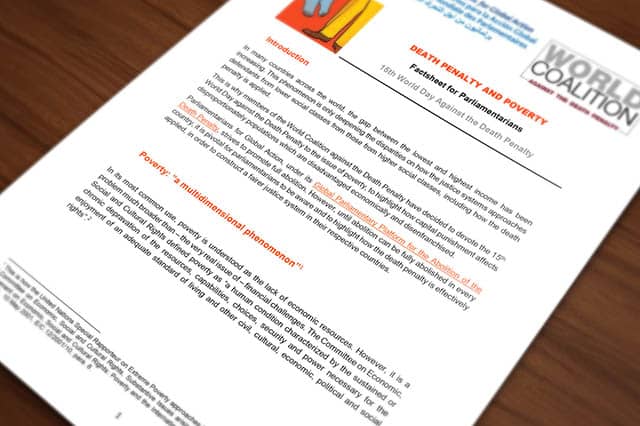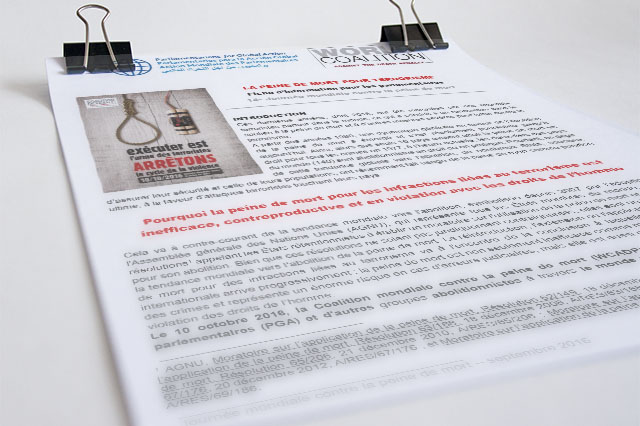Parliamentarians for Global Action (PGA), a member of the World Coalition against the Death Penalty (WCADP), is launching today a Parliamentary Factsheet on Poverty and the Death Penalty.
10 October 2017 marks the 15th World Day against the Death Penalty. Members of the World Coalition against the Death Penalty have decided to devote this year’s World Day to the issue of poverty, to highlight the reasons why people living in poverty are at a greater risk of being sentenced to death and executed.
Publication

Death Penalty and Poverty
A factsheet highlighting how capital punishment affects economically disadvantaged and disenfranchised communities.
Description
In many countries across the world, the gap between the lowest and highest income has been increasing. This phenomenon is only deepening the disparities on how the justice systems approaches defendants from lower social classes from those from higher social classes, including how the death penalty is applied.
This is why members of the World Coalition against the Death Penalty have decided to devote the 15th World Day against the Death Penalty to the issue of poverty, to highlight how capital punishment affects disproportionately populations which are disadvantaged economically and disenfranchised.
PDF(s)
Additional Details
- Publication Type: Factsheet
- Author(s): World Coalition Against the Death Penalty; Parliamentarians for Global Action
The death penalty is used discriminatorily, often against the most vulnerable people, and should be abolished. Its application is inextricably linked to poverty. Social and economic inequalities affect access to justice, and especially for those who are sentenced to death, for several reasons: defendants may lack resources (social and economic, but also political power) to defend themselves and will in some cases be discriminated against because of their social status. Individuals from lower social classes are more likely than their peers from those from higher social classes to be convicted and sentenced more harshly, including to the death penalty.
Until the death penalty is fully abolished in every country, it is pivotal for parliamentarians to be aware and to draw attention to how the death penalty is applied, in order to create and advocate for a fairer justice system in their respective countries.
As legislators, opinion leaders and representatives of the people, parliamentarians hold a pivotal role in ensuring that no one is victimized by the justice system on the basis of their economic and social background. The involvement of legislators can have a positive impact to limit the disproportionate effect of poverty on one’s rights to a fair trial and to be protected against any form of discrimination.
In 2016, PGA had published a Parliamentary Factsheet on Terrorism-Related Offences and the Death Penalty.
Coming from a region where the death penalty is fortunately an issue of the past, I am determined to support the abolitionist movement throughout the world. Until we can be certain that no country endorses this brutal and irreversible sentence, we need to ensure that poor people and others who are already disenfranchised are not receiving the death penalty disproportionately. I believe that this factsheet is a useful tool for parliamentarians of both abolitionist and retentionist countries to better understand how poverty affects the justice system and how to protect the impoverished from an unjust sentence, especially the death sentence.Ms. Barbara Lochbihler, Member of the European Parliament (Germany)
Vice-Chair of the Human Rights Sub-Committee, Member of PGA’s Executive Committee and Convenor of the International Law and Human Rights Program
As a representative of my fellow countrymen, I am deeply concerned by the unjust treatment of our most vulnerable citizens by the justice systems, especially since the moratorium on the death penalty was revoked in 2014 in Pakistan. I believe it to be my duty to raise this issue in Parliament, with the government and in my constituency, so that poverty no longer means the difference between life and death before a tribunal. This is a very complicated topic, and one that we cannot solve in one day, but I firmly believe that this factsheet can serve as a good first step for my colleagues and I to tackle the problem.Hon. Naveed Qamar, Member of the National Assembly (Pakistan)
Member of PGA’s Executive Committee
This Factsheet highlights the injustices and unfair treatment that can be encountered by poor people in the justice system. My country is considering implementing its first executions in more than 60 years. To avoid irreversible miscarriages of justice that can happen when giving a death sentence, I will continue to urge Maldives authorities to halt plans to carry out any executions and establish an official moratorium on the implementation of the death penalty. The information found in PGA’s factsheet will further bolster this effort, and complements the excellent compendium provided by PGA with its 2016 Factsheet highlighting the tragic correlation between the surge in executions and the adoption of counter-productive anti-terrorism laws.Hon. Ahmed Mahloof, Member of the Parliament of the Maldives
Spokesperson for the opposition, PGA Member
Although the Democratic Republic of the Congo has not carried out any execution for more than 10 years, the justice system in my country still gives out death sentences in significant numbers. I believe that this Factsheet will be very helpful in my efforts to advocate to my fellow parliamentarians and my government for a justice system that would be fairer to all sections of the Congolese people, and for the definitive abolition of the capital punishment.Hon. Serge Mayamba, Member of the National Assembly of the Democratic Republic of Congo
Treasurer of PGA’s National Group in DRC







